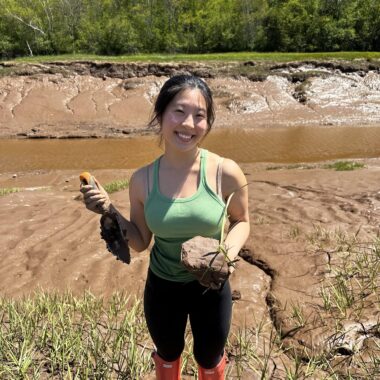
Salt marshes are unsung heroes of coastal environments, yet the interactions between plants and fungi in salt marsh sediment remain understudied.
Sporobolus roots were collected, underwent sterilization, and fungi were cultured onto three media types for DNA extraction and species-level identification.
Objectives:
1.Determine what fungal communities are associated with Sporobolus roots in each salt marsh site, and their effect to these plants
2.Identify plant growth effects of root endophytes inoculated into Sporobolus roots in Tissue Culture
Charlotte Peng
Charlotte is an Honours Biology Co-op student, and is also an Arthur L. Irving Scholar. Her project investigates the root endophytic fungal community of three salt marsh grass species collected from four Minas Basin salt marshes.
These coastal wetlands are vital for coastal ecological stability. Within plant roots, there are micro-fungi called endophytes which grow undetected. By examining the root composition of Sporobolus species in salt marshes, it is possible to identify fungi that benefit the plants, contributing to robust ecological restoration efforts. I am very excited to study coastal fungal biodiversity in Nova Scotia since the fate of salt marsh ecosystems carries significant implications in the context of climate change.
Charlotte says, “I love working in the K.C. Irving Centre with its world-class facilities, including the Plant Tissue Culture Lab, and finding inspiration from the natural world surrounding me”.


 Acadia University
Acadia University